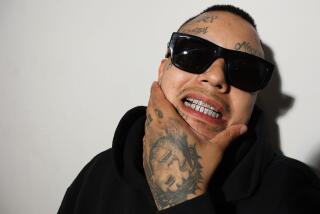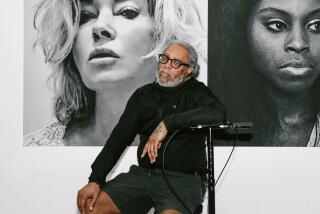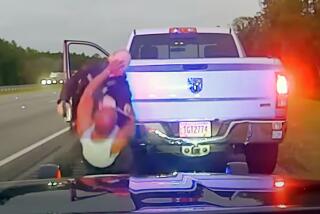His long-awaited release
- Share via
KINGSTON, JAMAICA — The Hilton Hotel here is the reggae scene’s version of L.A.’s the Ivy: a place where celebrity sightings are a dime a dozen, and the staff is indifferent to fame. Until, that is, one day in July, when Jah Cure ambled freely into the lobby.
Flanked by a small entourage, the diminutive, dreadlocked Jamaican singer was showered with attention -- not all of it the rock-star variety. Some rushed forward to offer smiles and greetings; others stood agape, in half-shock.
“Me can’t believe him here,” a woman behind the coffee counter muttered in Jamaican patois, shaking her head. “After what him did, and now him go free. Terrible.”
The mixed response is not surprising; Cure, as he’s known, is vastly popular for being two very incongruous things: a brilliant crooner of Bob Marley-esque love-and-peace reggae -- and a convicted rapist. July 28, the day he walked into the Hilton, was the day he was paroled from Tower Street Adult Correctional Centre after nearly eight years in prison.
For much of that time he was debated, beloved, reviled. He had an unofficial lobby group -- the “Free Jah Cure” movement was behind MySpace sites, T-shirts, even license-plate frames -- and the support of a slew of reggae artists who asserted his innocence at show after show. He was Jamaica’s first incarcerated musical icon, and the days surrounding his release were suffused with the sort of buzz befitting a freshly freed political prisoner: His photo was on newspaper covers, his name on the lips of media folk and taxi drivers alike.
“People in the street, they point and jump and scream. I never expected so many people to recognize me,” Cure, 28, said in an interview in a Kingston studio, three days after his release. Sporting True Religion Jeans, multicolored Adidas sneakers and a gleaming diamond chain with matching bracelet, he seemed shy, distracted and nervous: a man beleaguered by the limelight.
“I haven’t been able to eat, barely at all, since getting out,” he admitted, pausing from the interview to take several bites of a fish sandwich and fries. “I was so anxious to get here.”
His freedom is feted by promotional events: the release of his fourth album, “True Reflections . . . A New Beginning,” a stellar retrospective of tracks recorded and released while he was behind bars; and, from Oct. 12 to 14, Curefest -- a music festival climaxing in Cure’s first Jamaican stage performance since his release.
He is already a star in the international reggae world -- his only show since his release, at a reggae festival in Holland, was attended by nearly 20,000 fans -- and his newfound freedom could catapult Cure and the genre to new heights of success. Reggaeton has found its overseas niche, after all, but no reggae act other than Sean Paul has lately achieved crossover success on mainstream U.S. charts.
But while plenty of artists, from Merle Haggard to James Brown, have spent time behind bars, rape is a conviction with pungent staying power, especially for a singer of love songs. And while there was cachet in being an incarcerated artist asserting innocence -- a spiritual martyr, a casualty of injustice -- can Jah Cure retain his allure as a free man?
Celebrity in the cell
Cure’s celebrity, after all, was nourished by prison walls. At the time of his trial and conviction, he was an up-and-comer with promising connections: Born Siccaturie Alcock in a depressed area of Montego Bay, he left for Kingston at 13 and caught the ear of reggae star Capleton, who introduced him to Rastafarianism and dubbed him “Jah Cure,” in honor of the Rasta god and the “healing” marijuana he smoked.
He recorded a spiritual duet with popular artist Sizzla and toured Europe with Lover’s Rock legend Beres Hammond. Then, as he put it, “I come back and get into this mess and go inside.”
Both Cure and the unnamed victim have, in earlier interviews, presented versions of “this mess.” According to her, in November 1998, she and her aunt were raped and robbed at gunpoint in Montego Bay by two men in a car. She noted the car’s license plate and reported it to the police; one week later, Cure -- whose vehicle allegedly bore that license plate -- was detained by police and his accuser outside a nightclub, where the victim identified him based on his voice. Cure pleaded innocent, but before a Gun Court magistrate in 1999, the singer -- 19 at the time -- was given 15 years in prison, reduced to 12 years after an appeal.
Rumors about the case abound: claims that Cure was discriminated against because he is a Rastafarian, that DNA evidence was never obtained, that the aunt’s rapist -- alleged to be Cure’s companion -- was never caught, that the victim was contacted by phone by Cure’s celebrity supporters and offered money to retract her accusation but nonetheless held to her story.
Those hoping for conclusive answers now that Jah Cure is a free man will be sorely disappointed.
“I don’t even want to speak of that,” Cure said of his case. “I just want to get that behind me. Because I’ve been through so much, and I already do the time. It’s my life; I will take any responsibility.”
People can “do their research,” he explained. “They know my side and I don’t even have to repeat it.” Pressed, he conceded, “I have to be careful what I say -- from both sides it will hurt. It’s not gonna really do me no good, nor the person.”
About Jamaica’s Department of Correctional Services, Cure was similarly mum. “I don’t want to bash anybody because I have a lot of friends down there still, and I don’t want it to be bad for them.”
He did say that he quickly learned the ropes in a tough prison system that has been lambasted for human-rights abuses.
“I survived and it was not pretty,” he said. “But if I explain to you in detail the way it was, it would have an effect on those who have to survive that way and it would be harder on them. Read between the lines? I cannot talk.”
A love song smash
Jah CURE does say that music was vital to his survival. He began recording songs on a mobile device sent to him by a Jamaican music management company; a bribed prison official -- “It’s a pity I can’t say his name, because he has had such an effect on my life” -- acted as middleman between Cure and producers sending him tracks.
One such producer was Jamaican hit maker Don “Corleon” Bennett, who says he paid about $3,000 in 2004 to get a slow, one-drop beat to Jah Cure, who used it to record the song that changed his life: “Longing For” showcased an adoringly aching, perpetually strained voice that toed the line between a lovesick man and an over-insistent child.
Bennett says he knew it would be a hit -- “the emotion in it was so intense” -- but even he was surprised when “Longing For” achieved anthem status and made Jah Cure a bona fide star.
In prison, Cure’s life became a bit easier, he said, because fellow inmates and guards respected him, and he was able to use his earnings and connections to buy soccer jerseys and a television for himself and other prisoners.
Outside prison, Cure’s fame sparked heated debates in the reggae community: How could one wrap one’s head around love for the love songs of a convicted rapist? Was it right for a jailed artist’s music to roam freely through the public domain?
“When I’d see them ‘big up’ Jah Cure, I’d get so annoyed and inflamed and angry,” says Miss Kitty, a prominent Jamaican media personality. “What are you doing? Don’t you have a mother? A daughter?” She has little patience for Jah Cure’s claims of innocence: “You’re charged with it, the Crown found you guilty, and you come out -- not a problem. But still, it doesn’t change: You raped somebody.”
Others in the industy are more forgiving. “As long as him serve him time for whatever crime him committed, even if he did or didn’t do it, we welcome him back. He’s a very talented youth,” remarked O’Neil Edwards, member of dancehall trio Voicemail.
Says dancehall artist Spragga Benz, who used to visit Cure in prison, “I kinda put that aside, whether he’s guilty or innocent -- I leave that to greater powers. Me think upon his music and his potential to create a worldwide impact.”
Cure has already affected Jamaica’s correctional system, by making prisoner rehabilitation part of its touted aims. As his fame grew and Jamaica’s Department of Correctional Services battled backlash from citizens fuming that a convicted rapist’s music was on Jamaica’s list of exports, Supt. Gladstone Wright -- who, he said in a private interview last year, is trying to break into the music industry -- was permitted to launch the Rehabilitation Through Music program, through which inmates were allowed to record and release music under the guise of “rehab.”
Cure released a hit single and music video via this program in 2005: “True Reflections,” a stunning, searing lament about time spent “behind these prison walls / doing my paces, doing my time.”
The Rehabilitation Through Music Program never quite took off, and Cure says it was simply a label for the recording work that he and other inmates were already engaged in. But he still speaks of his plan to “rehabilitate some inmates” using music, mentioning his incarcerated friend Serrano as an up-and-coming artist whom he supports. Whether reggae will follow in hip-hop’s footsteps and forge a tradition of behind-bars releases -- from Shyne to Pimp C, incarcerated rappers have made names for themselves -- remains to be seen.
In the meantime, Jah Cure is focused on making music -- he says he will soon start planning his next release -- and disregarding his overwhelming public reception. “Everybody want a piece of me, but I am just here to forgive and show love,” he said. “I don’t have no grudges in my heart -- my heart is pure.”
More to Read
The biggest entertainment stories
Get our big stories about Hollywood, film, television, music, arts, culture and more right in your inbox as soon as they publish.
You may occasionally receive promotional content from the Los Angeles Times.










